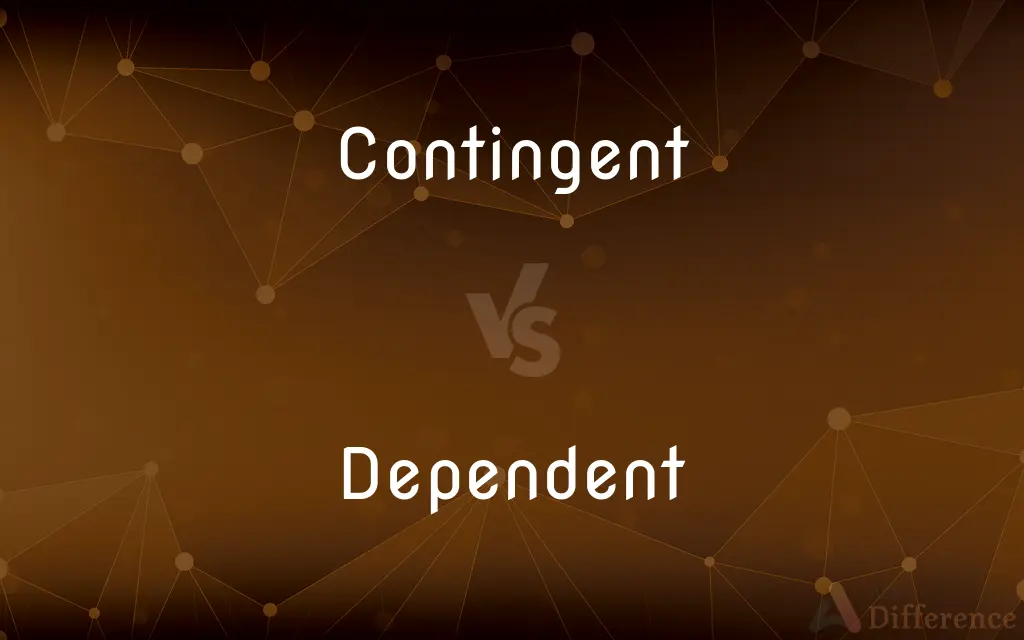Contingent vs. Dependent — What's the Difference?
By Fiza Rafique & Maham Liaqat — Updated on May 4, 2024
Contingent means conditional or dependent on other factors; dependent implies reliance on something else for support or existence.

Difference Between Contingent and Dependent
Table of Contents
ADVERTISEMENT
Key Differences
Contingent refers to situations or outcomes that are conditional, dependent on specific circumstances or events that may or may not occur. On the other hand, dependent describes a state of relying on something for support, sustenance, or existence.
For example, a job offer might be contingent on passing a background check, whereas a child is dependent on their parents for basic needs.
Contingent situations often involve scenarios that might change based on various factors, while dependency typically involves a consistent state of reliance.
In legal and insurance contexts, contingent can describe rights or benefits that depend on a future event, whereas dependent often relates to someone who relies on another financially.
Scientifically, a hypothesis can be contingent on variables that influence experimental outcomes, whereas research may depend on funding.
ADVERTISEMENT
Comparison Chart
Definition
Conditional, possibly happening based on other factors.
Relying on something else for support or existence.
Usage
Often used in scenarios with multiple possible outcomes.
Commonly describes a consistent state of reliance.
Contexts
Legal, business, scenario planning.
Emotional, financial, biological dependency.
Examples
Job offer contingent upon drug testing.
Children dependent on parents for care.
Outcome
Variable based on certain conditions being met.
Fixed as long as the source of dependency is present.
Compare with Definitions
Contingent
Conditional involvement or participation.
Her attendance at the meeting is contingent on her health.
Dependent
Conditioned by or subject to another.
His happiness is dependent on his work-life balance.
Contingent
Possible but not certain to occur.
Success in this project is contingent upon team collaboration.
Dependent
Relying on someone or something for support.
The young bird is dependent on its parents for food.
Contingent
Existing or true under specific conditions.
Payment is contingent upon completion of the work.
Dependent
Unable to exist or sustain without another.
His decision was heavily dependent on his family's advice.
Contingent
Dependent on certain conditions being met.
His agreement to the deal is contingent on receiving a bonus.
Dependent
Supported by another financially or emotionally.
As a student, she is dependent on scholarships.
Contingent
Subject to change based on external factors.
The trip is contingent on the weather.
Dependent
Reflecting a need or necessity towards something.
Plants are dependent on sunlight for photosynthesis.
Contingent
Subject to chance
The contingent nature of the job
Dependent
Contingent on or determined by
The various benefits will be dependent on length of service
Contingent
Occurring or existing only if (certain circumstances) are the case; dependent on
His fees were contingent on the success of his search
Dependent
Requiring someone or something for financial or other support
An economy heavily dependent on oil exports
Households with dependent children
Contingent
A group of people sharing a common feature, forming part of a larger group
A contingent of Japanese businessmen attending a conference
Dependent
(of a clause, phrase, or word) subordinate to another clause, phrase, or word
A clause dependent on another clause
Contingent
Liable but not certain to occur; possible
"All salaries are reckoned on contingent as well as on actual services" (Ralph Waldo Emerson).
Dependent
Variant spelling of dependant
Contingent
Dependent on other conditions or circumstances; conditional
Arms sales contingent on the approval of Congress.
Dependent
Determined, influenced, or controlled by something else.
Contingent
Happening by or subject to chance or accident; unpredictable
Contingent developments that jeopardized the negotiations.
Dependent
(Grammar) Subordinate to another clause, phrase, or word.
Contingent
(Logic) True only under certain conditions; not necessarily or universally true
A contingent proposition.
Dependent
Needing to continue use of a drug or other substance or engagement in a specific activity in order to avoid experiencing withdrawal symptoms
Dependent on alcohol.
Contingent
A group or detachment, as of troops or police, assigned to aid a larger force.
Dependent
(Archaic) Hanging down.
Contingent
A representative group that is selected from or part of a larger group.
Dependent
Also de·pen·dant One who relies on another, especially for financial support.
Contingent
An event or condition that is likely but not inevitable.
Dependent
Relying upon; depending upon.
At that point I was dependent on financial aid for my tuition.
Contingent
An event which may or may not happen; that which is unforeseen, undetermined, or dependent on something future.
Dependent
(statistics) Having a probability that is affected by the outcome of a separate event.
Contingent
That which falls to one in a division or apportionment among a number; a suitable share.
Dependent
Used after a particle (with one or two exceptions), such as those which express questions, subordinate clauses, and negative sentences.
Contingent
(military) A quota of troops.
Dependent
(medicine) Affecting the lower part of the body, such as the legs while standing up, or the back while supine.
Contingent
Possible or liable, but not certain to occur.
Dependent
Hanging down.
A dependent bough or leaf
Contingent
(with upon or on) Dependent on something that is undetermined or unknown, that may or may not occur.
The success of his undertaking is contingent upon events which he cannot control.
A contingent estate
Dependent
(US) One who relies on another for support
With two children and an ailing mother, she had three dependents in all.
Contingent
Not logically necessarily true or false.
Dependent
(grammar) An element in phrase or clause structure that is not the head. Includes complements, modifiers and determiners.
Contingent
Temporary.
Contingent labor
Contingent worker
Dependent
(grammar) The aorist subjunctive or subjunctive perfective: a form of a verb not used independently but preceded by a particle to form the negative or a tense form. Found in Greek and in the Gaelic languages.
Contingent
Possible, or liable, but not certain, to occur; incidental; casual.
Weighing so much actual crime against so much contingent advantage.
Dependent
Hanging down; as, a dependent bough or leaf.
Contingent
Dependent on that which is undetermined or unknown; as, the success of his undertaking is contingent upon events which he can not control.
Dependent
Relying on, or subject to, something else for support; not able to exist, or sustain itself, or to perform anything, without the will, power, or aid of something else; not self-sustaining; subordinate; - often with on or upon; as, dependent on God; dependent upon friends. Opposite of independent.
England, long dependent and degraded, was again a power of the first rank.
Contingent
Dependent for effect on something that may or may not occur; as, a contingent estate.
If a contingent legacy be left to any one when he attains, or if he attains, the age of twenty-one.
Dependent
Conditional; contingent or conditioned. Opposite of unconditional.
Contingent
An event which may or may not happen; that which is unforeseen, undetermined, or dependent on something future; a contingency.
His understanding could almost pierce into future contingents.
Dependent
Addicted to drugs.
Contingent
That which falls to one in a division or apportionment among a number; a suitable share; proportion; esp., a quota of troops.
From the Alps to the border of Flanders, contingents were required . . . 200,000 men were in arms.
Dependent
One who depends; one who is sustained by another, or who relies on another for financial support or favor; a hanger-on; a retainer; as, a numerous train of dependents.
A host of dependents on the court, suborned to play their part as witnesses.
Contingent
A gathering of persons representative of some larger group;
Each nation sent a contingent of athletes to the Olympics
Dependent
That which depends; corollary; consequence.
With all its circumstances and dependents.
Contingent
A temporary military unit;
The peace-keeping force includes one British contingent
Dependent
A person who relies on another person for support (especially financial support)
Contingent
Possible but not certain to occur;
They had to plan for contingent expenses
Dependent
Not independent;
Dependent children
Contingent
Determined by conditions or circumstances not yet established;
Arms sales contingent on the approval of congress
Dependent
Contingent on something else
Contingent
Uncertain because of uncontrollable circumstances;
The results of confession were not contingent, they were certain
Dependent
Of a clause; unable to stand alone syntactically as a complete sentence;
A subordinate (or dependent) clause functions as a noun or adjective or adverb within a sentence
The main (or independent) clause in a complex sentence has at least a subject and a verb
Dependent
Being under the power or sovereignty of another or others;
Subject peoples
A dependent prince
Dependent
Addicted to a drug
Common Curiosities
What does it mean to be dependent on someone?
Being dependent on someone means relying on them for support, financially or emotionally.
What is an example of a dependent relationship?
A classic example is a child who is dependent on their parents for care and upbringing.
Can a person be both contingent and dependent?
While typically used in different contexts, a person's actions can be contingent on conditions, and they can be dependent on others.
What does it mean for something to be contingent?
Something is contingent if it is conditional and depends on other factors for it to occur.
Is dependency always negative?
Dependency is not always negative; it can form the basis of supportive, nurturing relationships.
What are the psychological implications of dependency?
Psychological dependency can lead to a lack of independence and issues with self-esteem and decision-making.
How do contingent events influence decision making?
Contingent events require planning for multiple scenarios, impacting strategies and decisions.
Why is understanding the difference between contingent and dependent important?
Understanding these differences is crucial for accurate communication, especially in legal, scientific, and planning contexts.
How do businesses use contingent plans?
Businesses use contingent plans to prepare for various possible future scenarios to ensure continuity.
What makes a factor or condition contingent?
A factor is contingent if it changes or influences outcomes based on its presence or fulfillment.
Can contingent be used to describe financial agreements?
Yes, financial agreements often have contingent clauses that require certain conditions to be met.
What role does dependency play in ecology?
In ecology, dependency describes relationships like parasitism or mutualism, crucial for ecosystem dynamics.
Share Your Discovery

Previous Comparison
Tar vs. Pitch
Next Comparison
Act vs. PlayAuthor Spotlight
Written by
Fiza RafiqueFiza Rafique is a skilled content writer at AskDifference.com, where she meticulously refines and enhances written pieces. Drawing from her vast editorial expertise, Fiza ensures clarity, accuracy, and precision in every article. Passionate about language, she continually seeks to elevate the quality of content for readers worldwide.
Co-written by
Maham Liaqat















































